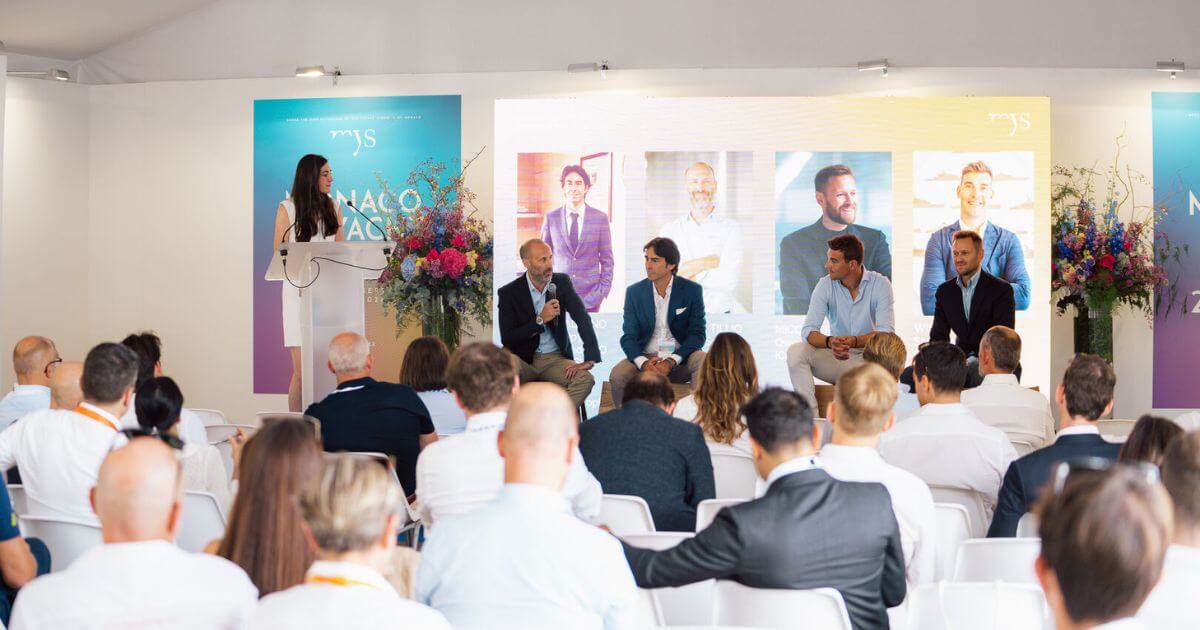Monaco Yacht Show 2024 Round Tables: Driving Innovation and Sustainability in Yachting
The Monaco Yacht Show 2024, in partnership with SuperYacht Times, hosted a series of dynamic round table discussions at the Yacht Design & Innovation Hub. These panels brought together top industry experts to tackle critical topics shaping the superyacht sector, from sustainable rebuilds and propulsion advancements to innovative interior designs and eco-conscious materials. Below is a summary of each discussion panel with three key takeaways.

The Rise in Rebuilds: A Closer Look at the Value of Rebuilds and Conversions
- Sustainability and Cost Benefits: Paolo Balzano (Palumbo Shipyards) and Manuel Di Tillio (Amico&Co) highlighted that rebuilds offer a cost-effective alternative to new builds, with shorter lead times and reduced environmental impact by repurposing existing vessels.
- Complex Project Management: Micca Ferrero (ICON Yachts) and Wim Verhoeff (Oceanco) emphasized the need for meticulous planning to manage the unpredictability of conversions, citing projects like ICON’s Project Master and Oceanco’s H3 as examples of sustainable transformations.
- Regulatory Challenges: Manuel Di Tillio noted that regulations, particularly for specialized vessels like ice-class yachts, limit design flexibility but ensure safety and longevity, driving the need for specialized expertise.
Key Participants: Paolo Balzano (Palumbo Shipyards), Manuel Di Tillio (Amico&Co), Micca Ferrero (ICON Yachts), Wim Verhoeff (Oceanco), moderated by Sophie Spicknell.
The Next Step for Propulsion: The Transition of the Superyacht Fleet
- Retrofitting Challenges: Andrea Venturelli (RINA) discussed the complexities of retrofitting propulsion systems, stressing the need for tailored solutions based on a yacht’s operational profile and owner preferences.
- Eco-Friendly Fuel Solutions: Daniel Chatterjee (MTU Rolls-Royce) and Lorenzo Savini (Siemens Energy) advocated for phased transitions to sustainable fuels like HVO and electrical propulsion to enhance efficiency and reduce emissions.
- Transparency Concerns: Jamie Barros (Water Revolution Foundation) raised issues about the credibility of HVO classifications, warning against practices like converting virgin oils into waste for biodiesel, which could undermine environmental benefits.
Key Participants: Daniel Chatterjee (MTU Rolls-Royce), Jamie Barros (Water Revolution Foundation), Andrea Venturelli (RINA), Lorenzo Savini (Siemens Energy), moderated by Enrico Chhibber.
Reconsidering the Interior Configuration
- Optimizing Space and Performance: Perry van Oossanen (Van Oossanen Naval Architects) stressed integrating interior layouts with exterior architecture to balance efficiency and comfort, as seen in projects like Project Genesis and Phi.
- Versatile Design Trends: Adrien Thoumazeau (Lateral Naval Architects) highlighted the shift toward multipurpose interiors, with concepts like “Free from Bulkheads” promoting open-plan designs for enhanced spatial flow.
- Sustainability in Interiors: Both panellists emphasized using eco-friendly materials and smart technologies, requiring close collaboration between naval architects, designers, and shipbuilders to meet modern owner demands.
Key Participants: Perry van Oossanen (Van Oossanen Naval Architects), Adrien Thoumazeau (Lateral Naval Architects), moderated by Sophie Spicknell.
How Can We Use Materials Onboard to Reduce Our Carbon Footprint?
- Sustainable Sourcing: Romain Sauvage (Gordon & Gaia) and Guido de Cesare (Marine Leather) advocated for using waste-based materials, like leather from meat industry byproducts, to minimize environmental impact.
- Recycling Challenges: Mark Boddington (Silverlining Furniture) discussed difficulties in recycling composites and adhesives, suggesting a focus on durable, reusable materials to reduce waste.
- Industry Education: The panel emphasized fostering a culture of sustainability through local sourcing, renewable energy in production, and transparency in material certifications to address client skepticism.
Key Participants: Romain Sauvage (Gordon & Gaia), Guido de Cesare (Marine Leather), Mark Boddington (Silverlining Furniture), moderated by Emma Dailey.
How to Create an Award-Winning Yacht with a Unique Brand Identity?
- Owner-Centric Design: Tim Davis (Burgess) stressed aligning a yacht’s brand identity with the owner’s vision and lifestyle, enhancing emotional connections and market appeal, especially for chartering.
- Innovative Design Elements: Cor D. Rover (Cor D Rover) highlighted the role of unique materials and design features in distinguishing a yacht, setting it apart in a competitive market.
- Setting Trends: Espen Øino (Espen Øino) emphasized creating bespoke, trend-setting yachts through innovation and attention to detail, ensuring a strong brand presence.
Key Participants: Tim Davis (Burgess), Cor D. Rover (Cor D Rover), Espen Øino (Espen Øino), moderated by Francesca Webster.
The Future of Onboard Technology
- Practical AI Applications: Maurizio Minossi (Videoworks) and Claudia Rossi (Rossinavi) highlighted AI’s role in enhancing functionalities like energy monitoring and water management, moving beyond hype to practical benefits.
- Cybersecurity Concerns: Massimo Minnella (Team Italia Marine) stressed the importance of securing interconnected onboard systems to protect communication and data from cyber threats.
- Technological Evolution: Daniel Kerkhof (Crestron Marine) viewed AI as a natural progression of technology, offering benefits to manufacturers and guests when applied effectively.
Key Participants: Massimo Minnella (Team Italia Marine), Claudia Rossi (Rossinavi), Daniel Kerkhof (Crestron Marine), Maurizio Minossi (Videoworks), moderated by Enrico Chhibber.
How Can We Make the Composite Lifecycle More Sustainable?
- Innovative Manufacturing: Kit Rogers (Atlas Carbon Products) called for advancements in composite production to enhance durability and reduce environmental impact from the outset.
- Circular Economy Focus: Artur Połoczański (Sunreef Yachts) emphasized reusing and repurposing materials to minimize waste, aligning with circular economy principles in catamaran production.
- Bio-Based Materials: Kenneth Nyfelt (Baltic Yachts) discussed the shift toward recyclable and bio-based composites, driven by client demand for eco-conscious, lightweight materials.
Key Participants: Kit Rogers (Atlas Carbon Products), Artur Połoczański (Sunreef Yachts), Kenneth Nyfelt (Baltic Yachts), moderated by Sophie Spicknell.
Source: SuperYacht Times

